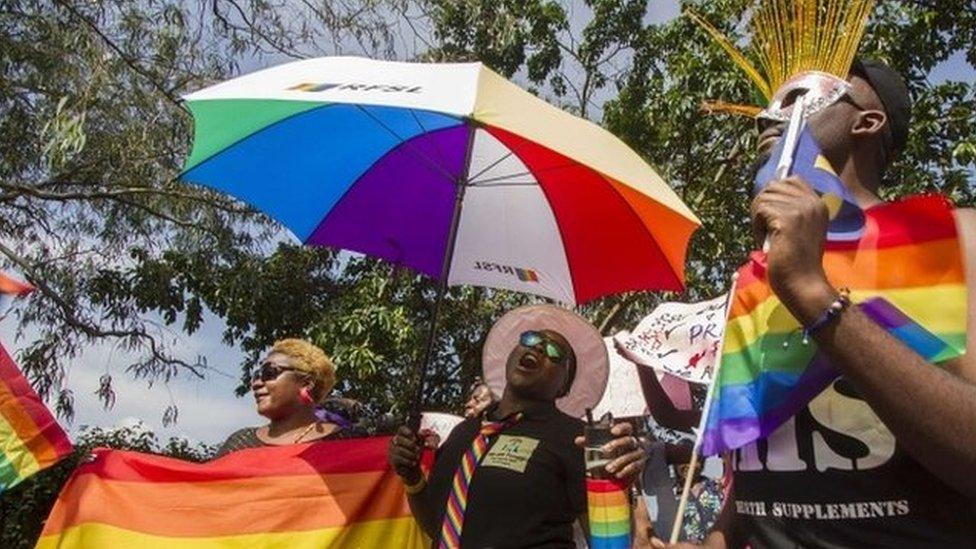Canada cities are banning police from Pride parades
- Published
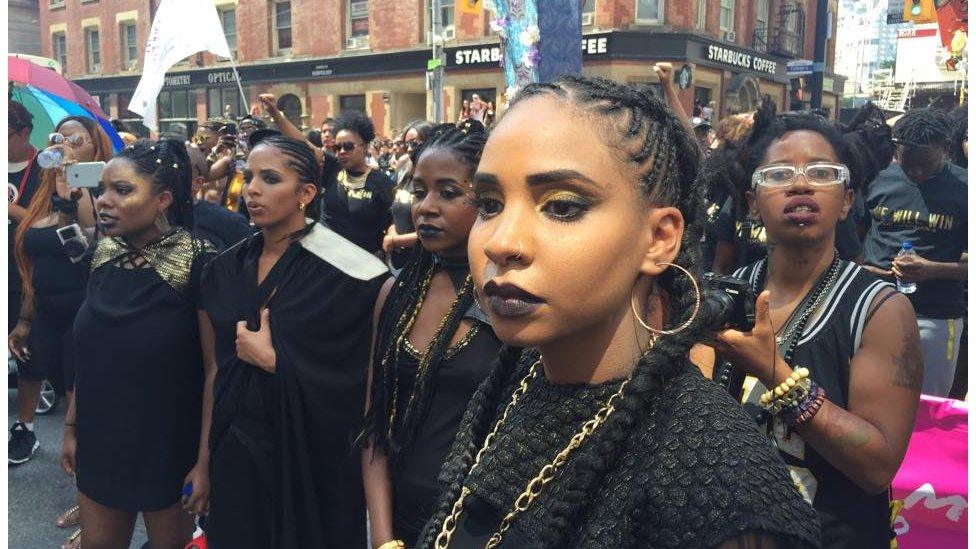
Black Lives Matter was the honoured guest at Toronto Pride, where it protested police presence.
Black Lives Matter says police should not march in gay pride parades. And across Canada, LGBTQ organisations are starting to agree.
It's hard to steal the spotlight from Justin Trudeau.
Clad in a pink button-down shirt open at the collar, all eyes (and iPhone cameras) were on the meme-able prime minister last July, when he marched in Toronto's Pride parade.
But when a sit-in organised by the local chapter of Black Lives Matter (BLM) halted the parade for half an hour the focus shifted, and in the process set off a fierce debate across the country about the relationship between police, LGBTQ communities and people of colour.
BLM Toronto had nine demands, including more representation of black, trans and indigenous queer people in Pride, more programmes for black queer youth and most controversially, no uniformed police marching in future pride parades.
The latter, they argued, was necessary for black queer people to feel safe and included in the parade.
But it also hit a nerve. Toronto Pride agreed to all of the demands on the spot, then backpedalled. The organisation's executive director resigned, and pundits and politicians everywhere weighed in on just what role police should be given in the parade.
This January at the annual general meeting, Pride members voted in favour of BLM's demands, including the ban on police floats.
Looking back, BLM Toronto co-founder Janaya Khan says the protest was a necessary measure in order to spark a discussion about how "racism is embedded in the very institution of policing".
"We are artists who understand how to facilitate spectacle and what kinds of steps are necessary to provoke dialogue," Khan, who identifies as queer and gender nonconforming, told the BBC.
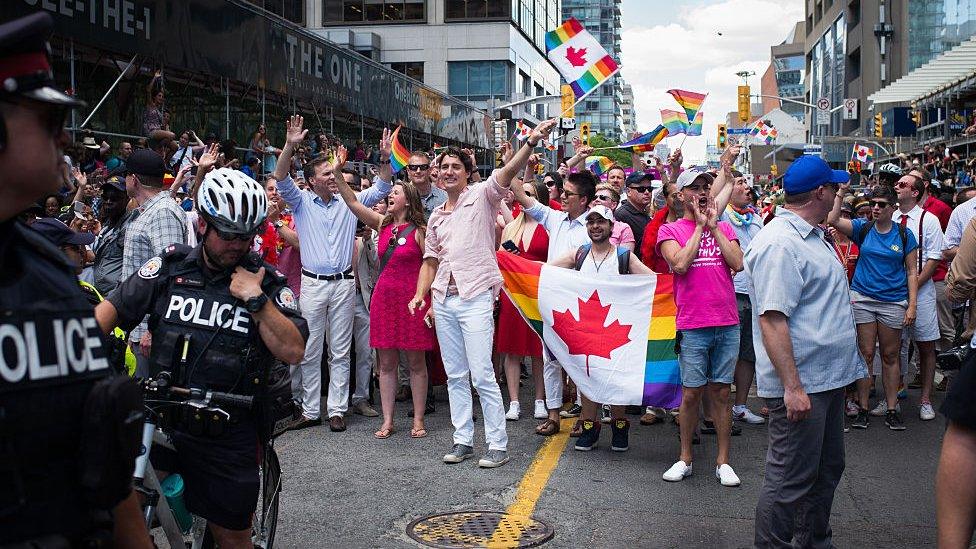
Justin Trudeau was the first prime minister to march in a Canadian Pride parade.
This call to action has since spread across the country. Earlier this month, Halifax Regional Police said they will bow out of their city's Pride parade.
"We feel that stepping away temporarily from the parade will best support the LGBT2Q+ [lesbian, gay, bisexual, transgender, two-spirited, queer, plus] community by helping to allow for meaningful discussion of this divisive issue," said Chief Jean-Michel Blais in a statement.
"After several months of discussion with Halifax Pride, we recognised that our participation in the parade may contribute to divisions in the LGBT2Q+ community which is contrary to our intent of building a strong and sustainable relationship."
Now, Vancouver is discussing doing the same. The Vancouver Pride Society has met with their local chapter of Black Lives Matter and is taking their concerns to Vancouver police to discuss reducing police participation in this year's parade.
"We are really hopeful that there will be a situation where Black Lives Matter will be happy with the way police participate," Vancouver Pride's executive director of operations Kieran Burgess told the BBC.
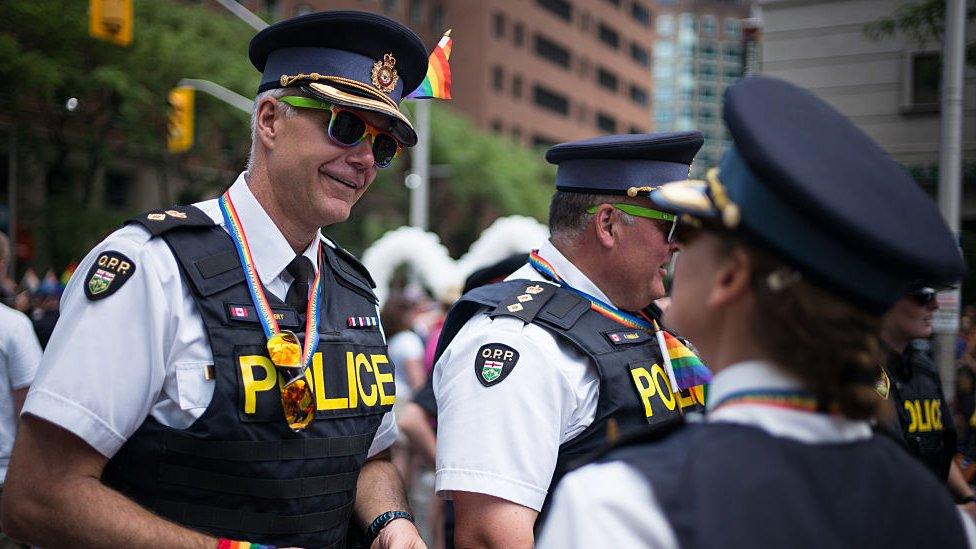
Hundreds of police march in Toronto's Pride parade, and in Pride events around the country.
The large role that police now play in Pride parades across the country is indicative of how police-LGBTQ relations have improved over the past few decades, and many say removing police from Pride will damage that relationship.
One gay cop lamented that police officers deserve to march just like any other group.
"Police officers are significantly represented in the LGBTQ community and it would be unacceptable to alienate and discriminate against them and those who support them. They too struggled to gain a place and workplace free from discrimination and bias," Constable Chuck Krangle wrote in an open letter to Pride Toronto.
In Vancouver, a counter-petition signed by some members of the LGBTQ community has also gained traction, garnering more than 2,600 signatures.
"In order to affect policy changes, we have to work with them," Metis transgender activist Sandy-Leo Leframbroise told the BBC.
Leframboise has been working with police to help them better serve the transgender community since the early 90s, and believes the Vancouver police force has been more responsive in addressing the needs of marginalised communities than some other police departments in Canada.
"We felt that they were targeted unjustly, and that they're a very important part of the parade," Leframbroise says.
Khan says BLM's disagreement is not with individual police officers, but with the institution of policing itself, and that there's a power imbalance between police, who enjoy legal protections ordinary citizens do not, and black communities who are often the victims of police violence.
"Those are the voices we should prioritise," Khan said, adding that it's up to each community to decide how to respond.
Although Burgess hopes both sides will be happy with this year's parade, he says it's important to recognise "they're not equally weighted petitions".
"One is a group that has suffered horrible oppression… and the other is the majority," he said.
- Published25 June 2016
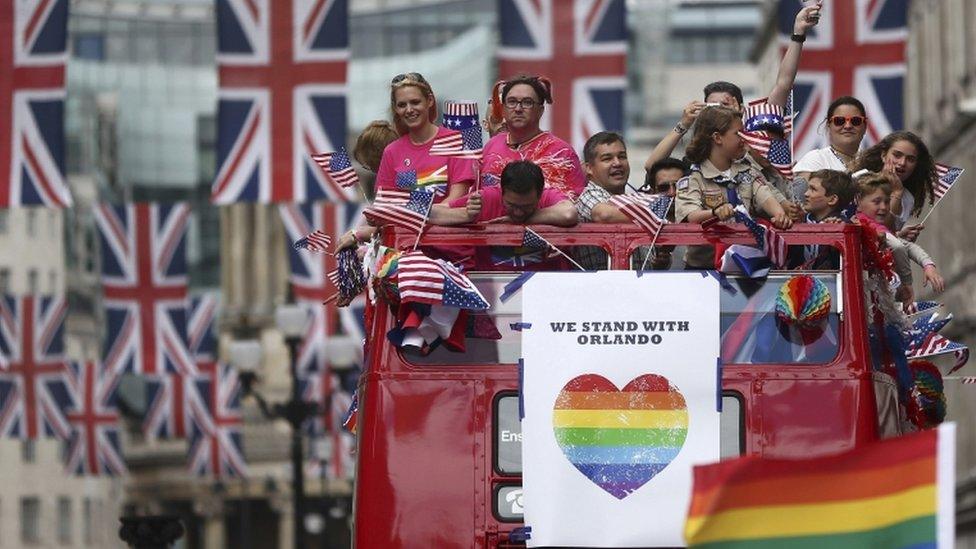
- Published24 September 2016
